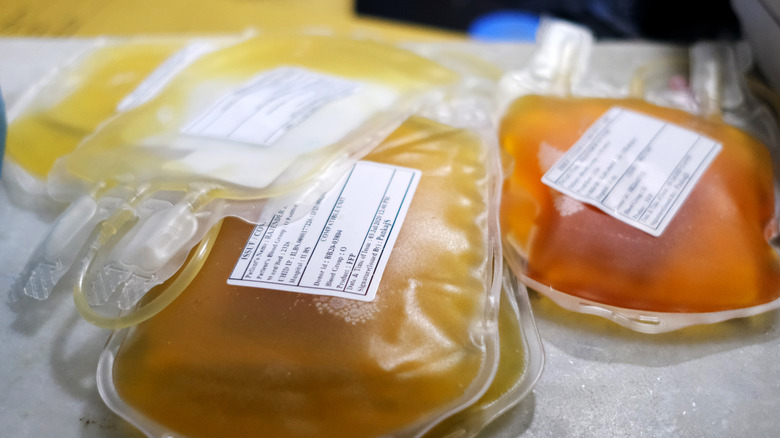How Much Blood Can You Donate?
Donating blood can help people in your community recover from a car accident, natural disaster, or even cancer. Before you donate, however, it's important to know your blood type. Type O — both positive and negative — is the type of blood that is most frequently requested by hospitals and clinics. That's because it's the most common blood type in the United States. However, only people with O-negative blood are universal donors, meaning they can give blood to people of any blood type (via American Red Cross). That being said, people of all blood types are encouraged to donate blood.
Donating blood is both simple and safe. A new and sterile needle is used to draw blood from each donor, and the actual donation process generally takes no more than about 20 minutes. Since most adults have around 10 pints of blood each, the average blood donation is a total of 1 pint. While this may seem like quite a bit of blood, your body will actually replace the blood volume you lost within 48 hours after your donation and your red blood cells will be completely replenished in a matter of weeks (via Memorial Sloan Kettering Cancer Center).
How often can you donate blood?
How often you can donate blood depends on the type of donation. The most frequent type of donation is the donation of whole blood. Whole blood contains every single component of blood, including red and white blood cells, plasma, and platelets (via Healthline). This type of donation can occur every 56 days. Other types of blood donations include plasma and platelet donations. You can usually donate plasma every 28 days and up to 13 times per year, while you can donate platelets every 7 days and no more than 24 times a year (via American Red Cross).
Red blood cell donations, on the other hand, are much more infrequent. Due to the amount of red blood cells that are typically drawn and donated, this type of donation can only occur ever 112 days and only 3 times per year. Certain medications, however, may affect how often you're eligible to donate blood. For example, if you're taking antibiotics, you'll need to complete the course of treatment before you can donate blood again.


